Overview
The mEducation program aims to improve math skills by delivering math problems via text and providing weekly 20-minute phone tutorials tailored to individual learning levels.
Already lagging in international assessments, the Philippine education sector faced even greater challenges exacerbated by the COVID-19 pandemic, widening the learning gap, particularly for students from disadvantaged households. Stemming learning loss and strengthening learning recovery, particularly in households that lack resources, require innovative and cost-effective strategies that can reach as many families as possible.
In 2021, IPA, in partnership with Youth Impact and the Department of Education (DepEd), implemented a phone-based math program focusing on foundational operations called mEducation. The mEducation program combines elements of Teaching at the Right Level (TaRL) and one-on-one tutoring through text messages and phone calls, aligned with DepEd’s priority in strengthening numeracy programs to help learners develop foundational skills and master competencies needed at their level. Given that more than 90 percent of households in the Philippines have at least a basic cellular phone (PSA, 2020), the program fits the local context.
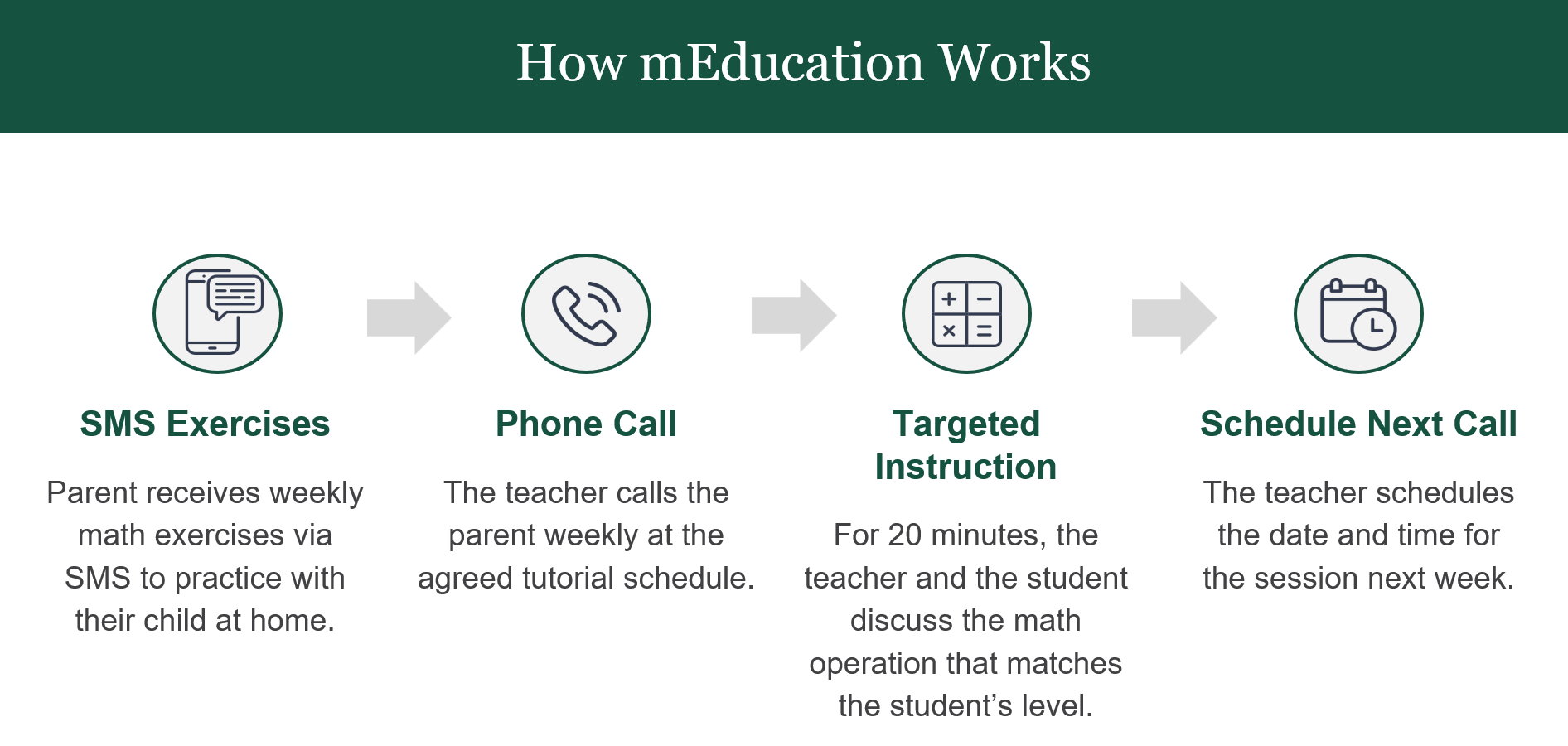
From Evidence to Impact
The program, developed by Youth Impact, demonstrated positive outcomes when first implemented in Botswana. To examine its scalability, researchers conducted a randomized evaluation in five countries, with IPA leading the evaluation in the Philippines. The program was implemented for 3,492 students, randomly assigned to one of three groups: a comparison group that did not receive the program, a group that received both phone calls and SMS, and an SMS-only group. Additionally, the program was implemented by both the Philippines Department of Education (DepEd) and IPA to assess its feasibility for government implementation and evaluate whether the program delivery had an impact on its effectiveness.
The full mEducation program (SMS + phone calls) in the Philippines boosted children’s learning by 40 percent. The Philippines was among the countries with the biggest impact among the five countries. Government-led implementation of mEducation was equally effective as when IPA implemented it. The program has an average cost of approximately USD 12 per child, yielding 3.4 learning-adjusted years of schooling (LAYS) per USD 100 spent, making it a cost-effective solution to improve children’s educational outcomes.
Partner with Us
IPA Philippines is seeking implementation partners—such as governments, NGOs, and universities—who are interested in implementing the mEducation program and helping us scale and expand the program to reach more learners who need remediation support. Feel free to download our partnership materials or complete our Partner with Us form to learn more about mEducation.
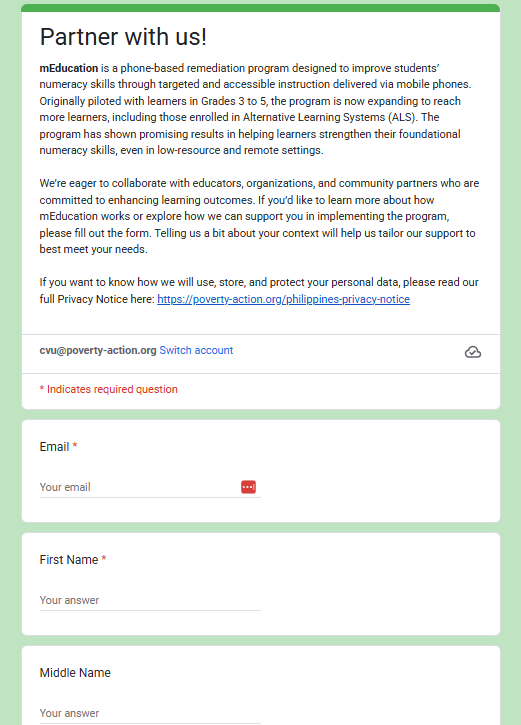 | 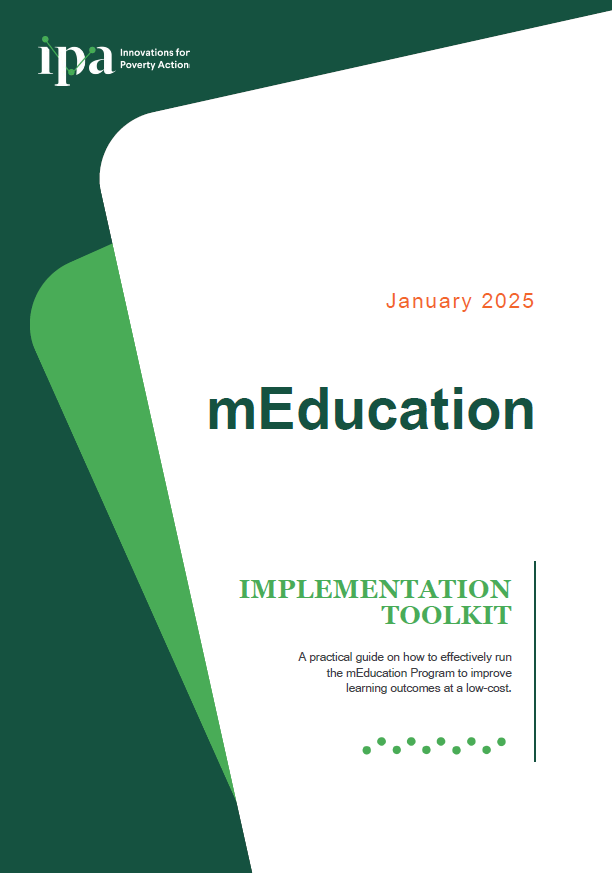 | 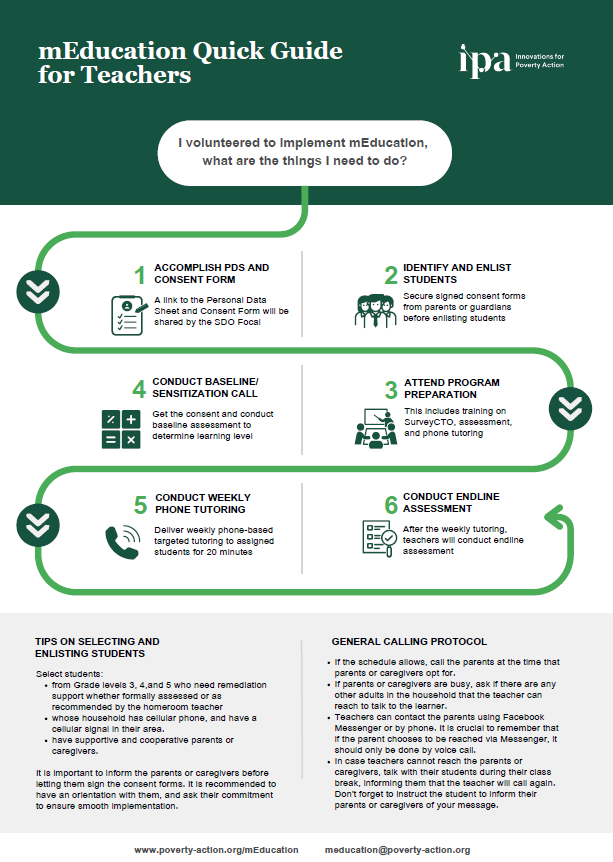 |  |
Scaling the mEducation Program
5,986 | 691 | 240 | 20 |
Learners | Teachers | Schools | SDOs |
After establishing mEducation as an effective program to improve learning outcomes, IPA started working with schools that expressed interest in implementing it. The goal is to reach more students while maintaining program fidelity. As the program expands, IPA will follow a strategy that starts with a demonstration phase and ends with the program’s ownership transfer to the schools allowing them to implement mEducation with minimal technical support from IPA.
Phase 1: Test and buy-in. IPA will provide full technical support to implement the program, including systems setup, training, and monitoring. Once schools have gone through Phase 1, they move up to the next phase.
Phase 2: Shared monitoring. IPA will support setting up systems and with the training, while program implementation will be co-monitored with school principals or math coordinators. We recommend schools do at least two rounds of program implementation before moving to the next phase.
Phase 3: Technology transfer. IPA will still provide support in systems setup, but partner Schools Division Offices (SDO) will lead the training and monitoring of program implementation.
Delivery Models
DepEd Teachers
We are partnering with DepEd Schools Division Offices to scale mEducation. Participating schools must enlist at least four teachers from Grades 3–5 to implement phone-based tutoring, integrating the program into existing systems for broader reach and sustainable impact.
MBHTE Teachers
In partnership with MBHTE and UNICEF-BARMM, IPA is piloting mEducation to assess its impact and cost-effectiveness. Findings will inform policy decisions and support the region’s goal of scaling evidence-based solutions to improve learning outcomes in the Bangsamoro region.
University Pre-Service Teachers
To expand the reach of the mEducation program without increasing the workload of DepEd teachers, we are partnering with universities to engage education students as mEducation tutors. These pre-service teachers offer phone-based support to elementary learners, gaining experience while improving student outcomes.
Partners
Department of Education
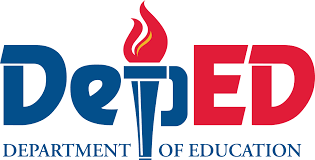
The Department of Education (DepEd) formulates, implements, and coordinates policies, plans, programs, and projects in the areas of formal and non-formal basic education. It supervises all elementary and secondary education institutions, including alternative learning systems, both public and private; and provides for the establishment and maintenance of a complete, adequate, and integrated system of basic education relevant to the goals of national development.
Since 2015, IPA has been a key partner of the Department of Education in generating evidence through rigorous evaluation of programs and building the monitoring and evaluation (M&E) capacity of staff.
Youth Impact

Youth Impact is an international evidence-based, youth-led organization that designs, implements, and evaluates cost-effective programs in health and education to improve children's lives at scale in Africa and beyond. Founded in 2014, Youth Impact is committed to sharing evidence to inform policies and promote evidence-based practices worldwide, applying entrepreneurial approaches to address social sector challenges and driving meaningful change for young people everywhere.
Since 2021, IPA and Youth Impact have been collaborating on mEducation, where Youth Impact provided research and technical support in setting up the required systems to implement mEducation and assisted in training the teacher. Youth Impact, while scaling mEducation in other countries, is committed to continuing the collaboration with IPA to scale mEducation in the Philippines.












